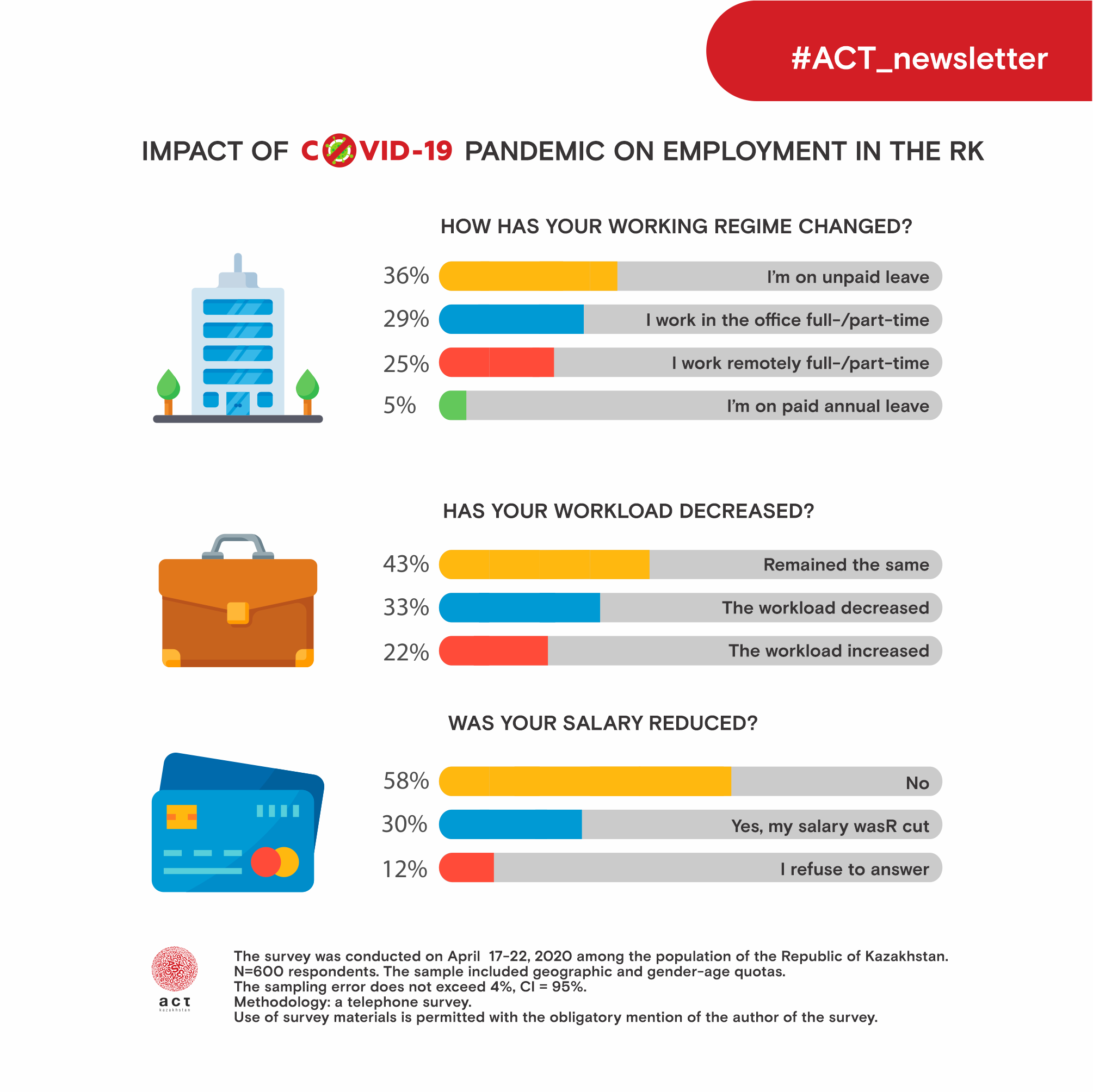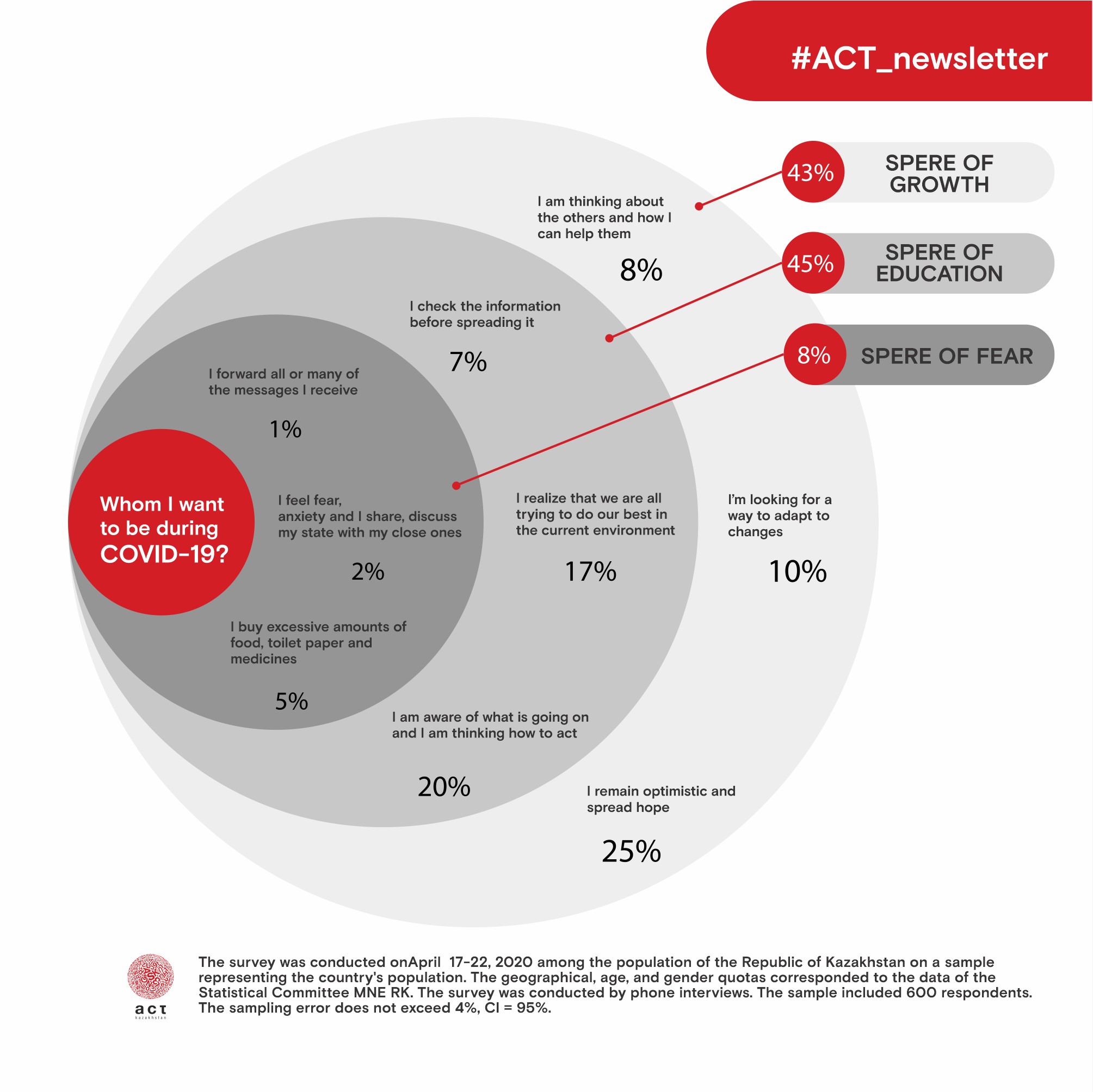




COVID-19 has conquered the whole world in an epidemic threatening the health of man and economy. Despite its geographical location and proximity to China, Kazakhstan and most of the Central Asian countries were among the latter who faced this epidemic and declared quarantine. For almost two months, most of the businesses were facing a previously unseen crisis that nearly immobilized the country. Many companies had to rebuild their system radically; many people have lost their jobs for various reasons.
ACT Kazakhstan brought together experts from various business areas to discuss how the pandemic changed the market, which trends lost their relevance, and which ones intensified, and how all that affected the behavioral habits of consumers. The discussion was held online, with the participation of leading marketers and CFOs of large businesses: Anton Kim (ForteBank), Yana Kononenko (CloudPayments), Bakhtiyar Sabdenaliyev (UIB University), Asker Ismankulov (QSR LLP (Burger King TM)), Nurken Rzaliyev (partner of ChocoFamily Holding, CEO of RahmetaseApp), Chingiz Nurazkhanov (AvtoGaz Trade LLP (Gasenergy)). Such a range of industries and opinions made the discussion lively and productive. This article provides a quick overview of the discussion held.
We tried to find out the experts’ opinions about has the world ever faced a crisis comparable to what is happening now and whether the accumulated experience is helping Kazakhstani companies to cope with the situation. We have got an answer that what is happening today cannot be compared with past crises because this economic crisis comes together with complete isolation that leads to new realities. One expert commented that the current situation affects not only the preparedness of companies for such challenges but also the psychological state of the employees. According to the experts, today, the rate of reaction to challenges, as well as the market’s ability to quickly adapt to consumer needs are important as never before. This day, we are not in a crisis but at the stage of transition from the customary rules of the game to new rules. The current moment has exposed the pain points in business that seemed acceptable in the past, but now they hinder business growth and development.
“This is not a crisis; this is the end. The end of the customary life. And the recovery period will take at least one and a half to two years.” Anton Kim, ForteBank
Talking about the end of quarantine and the new challenges, some experts consider it necessary to take into account the specifics of this situation and the possibility of resuming quarantine measures, since the virus may repeat itself by this fall and bring in a second wave which may be followed by undesirable consequences for the business. Experts believe that the business is facing a global task to automate its processes and build communication with customers in a way to secure them.
“Autumn is coming, and we can wait for the second wave. We have a small window of time when we can adapt our tools to be better prepared for the second wave.” Asker Ismankulov, QSR LLP (TM “Burger King”)
Regarding possible changes in marketing approaches after COVID-19, some experts believe that many companies will reconsider their views on digital tools. Even companies that previously neglected these resources will have to face these changes. The most convincing argument is that most offline sales today are losing money (except for food and medicine). The experts believe that the companies that were not focused on digital before will have to go digital actively.
“When the crisis is over, a big construction will start. Everyone will start building for the future, if, God forbid us, something happens tomorrow again, or there is some the second wave.” Nurken Rzaliyev, the partner of ChocoFamily Holding, RahmetApp CEO
However, according to some experts, despite the digitalization, the demand for classic advertising will remain; and TV and outdoor advertising will continue to work.
“Billboards will live!” Chingiz Nurazkhanov, Avtogaz Trade (TM “Gasenergy)
Speaking about changes in the organization of corporate work and future corporate development trends, the experts share the opinion that the areas of business able to give up working in the office will switch to the remote regime, either completely or partially. COVID-19 has become a powerful impetus for the development of e-commerce. Experts note that even those companies that previously have not considered their presence in the electronic market, today are well aware that this is a new opportunity and a chance to maintain and even expand their businesses. Experts specializing in e-commerce note the growth and predict positive dynamics of purchasing goods via the Internet, as well as the development of new habits among customers (e.g., non-cash payments).
“New realities affect the purchasing habits of Kazakhstanis. Previously, the state had repeatedly set the task of popularizing non-cash payments, but the process was slow. The frequency of using payment cards has increased with the advent of banks that offer a user-friendly interface and commission-free money transfers. Quarantine has contributed to the emergence of various online services such as food delivery, grocery delivery, etc. since many companies saw new opportunities in e-commerce. It is known that it takes 21 days to form a habit. We had much more time.” Yana Kononenko, CloudPayments
Even though COVID-19 brought negative trends for business, experts in the e-commerce industry share the opinion that the quarantine resulted in new opportunities for Kazakhstani business. E.g., previously, the consumers could place orders on international platforms, but today they have an opportunity to use similar local services. Experts believe that this trend may continue, and the consumers’ confidence and loyalty to Kazakhstani producers will increase. However, not all experts agree that this trend embraces a large part of Kazakhstani population. Not all consumers have access to and the opportunity to enjoy the benefits of digitalization. The reason for this discord might be that our experts focus on different consumer segments.
“Not so many people can use non-cash payments. Perhaps, they would like to, but they do not have such an opportunity. People just below the middle class cannot order online, work remotely, as well as those who have lost their jobs because of the impossibility to stay physically at work or due to the layoff. They will not change their habits that much.” Chingiz Nurazkhanov, Avtogaz Trade (TM “Gasenergy”)
The experts did not reach a consensus on the expected changes in consumer behavior. Some experts believe new trends will emerge, such as technology, online learning, remote work, online shopping, increased health care, and a focus on proper home nutrition. Respectively, the emergence of new trends will drive the business to develop and remain competitive in the market. Discussing whether there will be a V-shaped economic growth after the end of the emergency, experts agree that it is better to be a little pessimistic and not expect a sharp growth in this situation.
Despite some differences of opinion, the experts agree that teamwork and team spirit are the keys to survive the crisis and ensure sustainable business development.
“Strong IT team and internal corporate culture will be the main driver of further growth.” Bakhtiyar Sabdenaliyev, UIB University.
* ACT Kazakhstan will continue a series of panel discussions with experts in various fields.
COVID-19 was the reason for introducing the unprecedented quarantine measures in modern Kazakhstan to contain the spread of the disease. In general, Kazakhstan has not introduced such large-scale quarantines over the past 50 years. The first economic forecasts related to the consequences of the introduced quarantine measures have appeared since the very beginning of the quarantine measures in Kazakhstan and other countries of the world.
During the state of emergency, ACT Kazakhstan has conducted a survey among the population of the Republic of Kazakhstan on the impact of the introduced regime on the work activities. It is worth noting that before the emergency, 79% of the respondents had a permanent job, 7% had part-time employment, and 14% of the respondents were unemployed. At the time of the survey, 36% of respondents who had a full-time or part-time job were on unpaid leave, 29% continued to work in the office (21% – full-time, 8% – part-time), 25% worked remotely, and 5% were on paid annual leave.
Regarding the workload of those Kazakhstanis who continued working online and offline during the emergency, the workload remained the same for 43% of the respondents, increased for 22% of the respondents(in particular, it affected medical workers – 18%)), and decreased for 33% of the respondents (mainly, for those involved in trade – 20% and services – 18 %). Most of the respondents have not experienced material damage from the measures introduced, and their wages remain the same (58%). Almost a third of the respondents (30%) who had a job before the emergency noted a reduction in the wage (in 11% of cases, it went down to 1 minimum wage). 12% refused to share information on changes in wages.
The reduction of wages of affected Kazakhstanis amounted to:
What are the expectations of Kazakhstanis in terms of employment? 53% of respondents expect no changes, 10% expect to be sent on unpaid leave, 5% expect to be sent on paid leave, 4% expect a reduction in wages, 2% expect to lose the job. Everyone perceives self-isolation differently. Most of the employed respondents (79%) are ready to work even in a pandemic, while 16% would not go to work even if the quarantine removed.

During the quarantine, one could come across many recommendations from specialists, psychologists, coaches, opinion leaders, and ordinary people on how to cope with stress and fears brought by the COVID-19 pandemic.In that information flow, we paid attention to a very interesting infographic (https://clck.ru/NCBxg ) by Robert L. Leahy, Doctor of Psychology. This infographic is convenient for self-diagnostics. It will help you to see which sphere you are in: the sphere of fear, education, or growth! This scheme also supports tracking the movement from one sphere to another, depending on various internal and external circumstances.
Our curiosity turned into interest. Who we, the Kazakhstanis, are during COVID-19? We’ve transformed the scheme into a question with possible variants of answers, adapted it to a data collection methodology, and asked Kazakhstanis the following question: “How yould you describe your style of behaviour during the COVID-19 pandemic? Choose one variant of the answer which provides the closest description of your behavior in the current conditions.”
The results should be reviewed in the context of a certain time period of collecting data, since, as we mentioned before, a person can move from one sphere to another.According to our measurements, on 17-22 April 2020, most of the Kazakhstanis (45%) were in the sphere of education, 43% tended for the behavior typical for the sphere of growth, 8% have found themselves in the sphere of fear, and 4% found it difficult to answer.

Back in March 2020, we started discussing with our constant client conducting an in-hall test of soft drinks. The primary purpose was to test the tastes and properties of the drinks with existing and updated formulation to assess the potential for a market launch of a refreshed soft drink. The project involved tight timing for the very test stage – the second decade of April 2020. The emergency was not declared yet at that moment, but we had a feeling that the respondents became all less and less accessible for a personal interview. Then we started thinking about possible variants in the case the emergency was declared, and quarantine introduced.
Since it has actually happened, our wish to modify our procedures just strengthened. From the first day of the quarantine, we have already been working remotely in terms of conducting telephone surveys (you can read about this here: https://clck.ru/Mq9Fu ). It only gave us confidence that anything was possible, and we might propose a product with a known methodology in a refreshed format! Here, we should emphasize the interest, involvement, and desire to help us on the part of our client. We are immensely grateful to him for his trust and challenge that led to a fruitful result for both parties, Group brainstorming helped us analyze all the possible subtleties of the methodology that we planned to translate into an online format, as well as to identify potential difficulties and draw up a detailed work plan. The most struggling issue was ensuring personal safety and compliance with the recommended sanitary measures by all project participants (ACT employees and respondents). The following stages were implemented, keeping in mind the safety and compliance aspects.
Preparation of guidance materials:
Details about recruiting of respondents:
Online-purchase/delivery of products for conducting the in-hall test:
Technical support:
The sample size was 100 respondents. The data was collected on April 10-13, 2020. The obtained experience of conducting an in-hall test during quarantine allowed us to improve and hone all the workflows necessary to conduct this kind of research. We will be glad to assist you in doing marketing research during quarantine, as well as any other time!